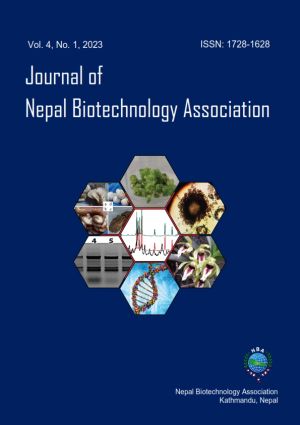In vitro Propagation and Assessment of Genetic Homogeneity using RAPD and ISSR Markers in Tinospora cordifolia (Wild.) Hook. F. & Thoms, An Important Medicinal Plant of Nepal
DOI:
https://doi.org/10.3126/jnba.v4i1.53443Keywords:
Coconut water, Genetic fidelity, ISSR, Plant tissue culture, RAPDAbstract
The Menispermaceae family includes the widely glabrous, succulent, climbing shrub Tinospora cordifolia (Gurjo), which has been found to have a variety of pharmacological and ethnomedicinal characteristics. T. cordifolia is also one of the most commercially exploited plants in pharmaceuticals. The nodal segment explants were initially cultured on Murashige and Skoog (MS) medium supplemented with various concentrations of 6-benzyl amino purine (BAP), and/or Kinetin (KIN) among which MS +BAP (2.0 mg/l) induced shoot initiation after 7 days of post-inoculation. The nodal segments were then excised and treated with various concentrations of BAP, BAP with KIN, and coconut water for the proliferation among which 5 mg/l induced significant nodal segment proliferation (9.0 nodal segments/per explant) and shoot length (8.0 cm). The efficacy of coconut water in increasing the nodal segment proliferation of T. cordifolia was tested and the shoot proliferation increased significantly at 5% and 10% of coconut water, however, the maximum response of shoot number (23.0), shoot length (12 cm) was in the MS medium supplementation with BAP (5mg/l) and 10% coconut water. The genetic fidelity of these plants was also confirmed by random amplified polymorphic DNA (RAPD) and inter simple sequence repeats (ISSR) markers in wild and in vitro cultures. This protocol is an efficient way for the in vitro mass propagation of true-to-type plantlets of T. cordifolia which provides a basis for germplasm conservation and sustainable utilization.




